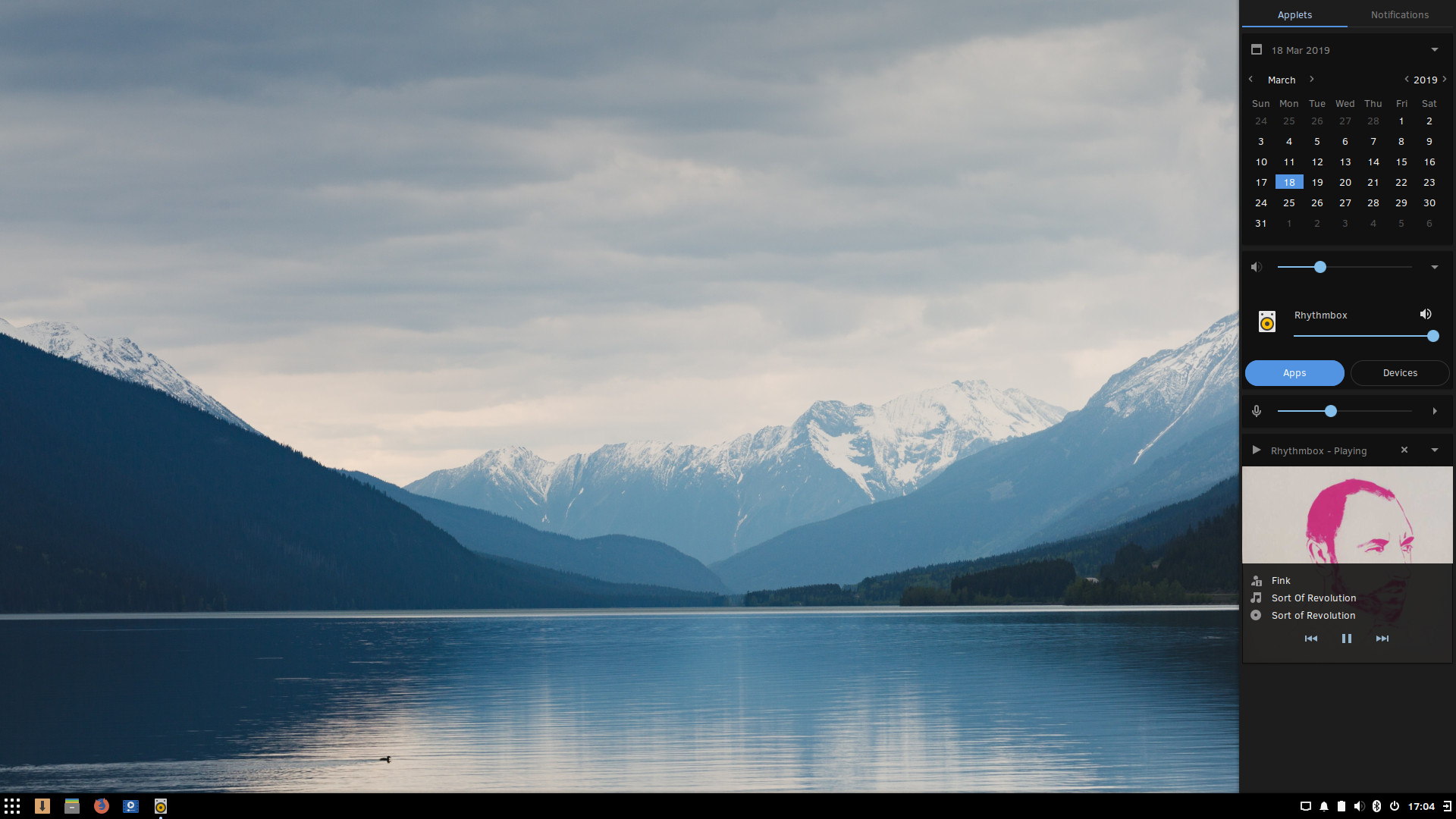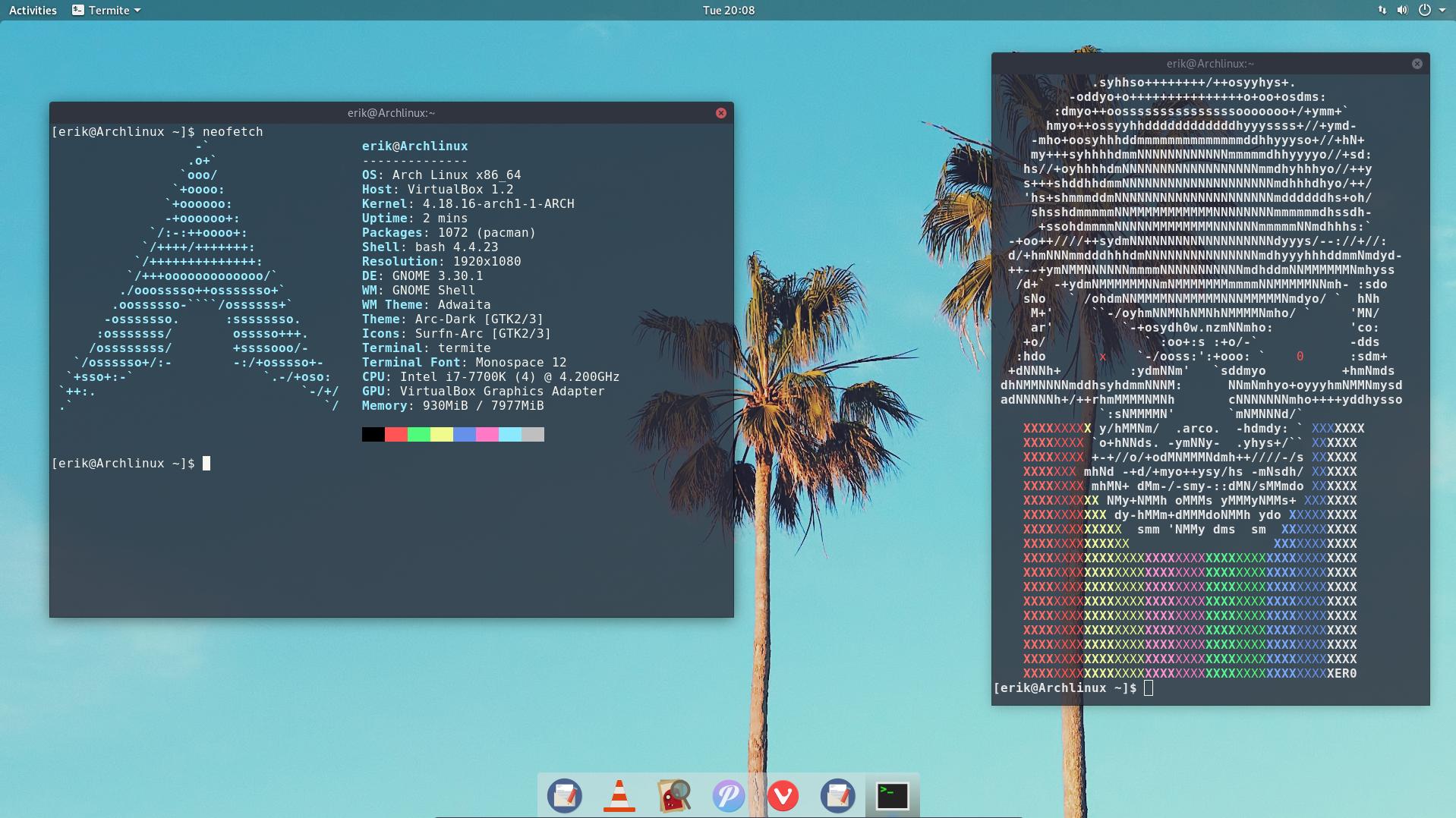Solus, Arch, Rolling In The Deep
For once I will not be writing just about gaming, while I will touch upon that aspect a little later on. At the heart of every Linux system is the choice of a distro. I have always valued the fact that there’s many options out there, but I did play it safe for a long time by staying pretty much in the Ubuntu/Mint environment (I used SUSE for a while too).
Over the past few years I have been interested in rolling release distros, for multiple reasons:
- Kind of sick of a hard update every year or two.
- Upgrading without reinstalling has broken things for me at one point or another.
- Not really happy with adding PPA in Ubuntu/Mint to benefit from newer packages for certain applications.
- Wanting to live a little more on the edge as well and discover what life looks like on the rolling side.
The potential drawbacks of rolling release distros are well known: since you are running more bleeding edge packages, you are more likely to encounter bugs that were not discovered until now - you are on the frontline after all.
There is now a lot of choices for rolling releases out there. OpenSUSE Tumbleweed, Gentoo, Solus, Arch and I guess Manjaro. Manjaro is based on Arch, includes a graphical installer, but updates less frequently than Arch.
Now, I have worked quite a while with Solus, Antergos (which is an installer for Arch), and Arch and I feel I have spent enough time with them to share my impressions.
I first started my journey with rolling release distros with Solus on two of my machines. I still have one of them running on Solus as we speak. Solus started out great, but proved to be a mixed bag so far. It’s easy to install, it looks nice by default, with Budgie as their own interface based on GTK. Their store app looks nice and has a decent amount of choice. If you were to stop at the first impression, it would be pretty positive. I guess if most of your tasks revolve around using a browser, you are good to go.
 Solus with Budgie
Solus with Budgie
However, the biggest problem with Solus is that it has a really restrictive policy when it comes to including new packages. They take the stance of having only one or very few applications that “do the job” rather than embracing choice. As a result, there are certain applications that I need to use but cannot find in the Solus repos. And no, not just a few. So, I end up spending a lot of time installing -devel packages and compiling from source. Just to give one recent example, last weekend I checked again and Digikam 6, while released already 2 weeks ago pretty much everywhere else, is still stuck on the 5.x version on Solus.
Then, there is the issue of packages not really up to date, or broken in one way or another. This is the job of maintainers, and I can clearly see that there is a great deal of variability between an OK maintainer and a good one. Blender, for example, is available on Solus’ repository, but cannot support (at the time of writing), GPU acceleration for rendering with Nvidia, which makes it completely useless. And this has been reported as an issue since 2017 but guess what, it’s still not fixed. I have experienced as well issues with PDF documents with Japanese text not rendering properly because of libpoppler, and my issue was open for months before it was closed and claimed “fixed” without any testing whatsoever as far as I could tell, since the problem persisted. So I reopened it, and honestly I have to resort to opening such PDF documents in the browser. How “polished”!
Also, Solus kind of expects you to follow closely what’s happening with their decisions. In 2018 there was a sudden change of repository URL and if you were just a regular Solus user who did not check news on a regular basis, you would fall in my situation when suddenly the updates are broken and there was no prior warning. Frankly, if you take that approach, at least make sure you have some kind of internal messaging system from within your distro to ensure full awareness of your user base. When I install Ubuntu there is zero expectation that I keep to date with Ubuntu.com posts and the like. Same with pretty much any other distro.
Let’s now touch upon gaming. Solus has been absolutely the worst choice for gaming last year (2018), while it’s getting better nowadays. For something like 6 months, while everyone else could enjoy DXVK with various Nvidia drivers updates and improvements, Solus was stuck on a very old Nvidia driver branch. It almost made me feel like I was back on SteamOS! For a rolling release distro, pretending to be gamer friendly on top of that, this was an absolute mess. And when they made newer Nvidia branches available, at first they clearly labelled them as “unsupported”, as in “if it breaks your install then too bad!”. So much for gaming-friendly behavior.
The Solus store has issues beyond simple package selection. You can only install a package at once. So if you want to install 10 packages, you have to click on “install” once and wait for the first one to finish before you can move to the next. There is no concept of queue whatsoever. Many times the store application would get stuck in a forever updating loop, too. There is almost no information about packages, at least nothing like proper descriptions or details regarding what files will be installed and so on. No reviews. You have the option to install apps from third party sources too, but after install there is no way to know if an update is available, you just have to click “check for update” and wait for the process to complete, without giving you any piece of information. The lack of transparency as to what actually happens is pretty bewildering.
Enough with Solus for now.
Then I tried Antergos on another machine, just to see. Antergos is basically Arch with an easy to use installer. Problem is, Antergos only had one job and it sucked at it: in the 2 times I installed Antergos in recent history (once with 4-5 months ago and last time was a week ago), there was always at least one issue with the installer. Recently Antergos refused to installed because one (ONE!) Arch package changed name. It seems they have absolutely no concept of unit test whatsoever since they only discovered that issue when it was reported on the issue tracker. That’s how bad QA is with Antergos. If you get past the installer, you are probably fine, but my trust that they do anything right is now down the toilet.
Well, I guess I need to thank Antergos nonetheless because their broken installer led me to try to install Arch Linux from scratch. I had always heard stories that Arch was “hard to install”, with a “steep learning curve”, and now I can honestly say this is complete horseshit if you are even a little familiar with Linux. The first time I installed Arch it took me 30 minutes as I was careful about each step of the way, to make sure I understood what I was doing. The second time (on another machine), I took me half that time and I added LUKS disk encryption on top. Arch is absolutely not difficult at all to install, you just shouldn’t be scared to get started from the command line, that is all. The Arch wiki is a true Bible that contains everything you need to know about just everything. It’s the best documentation of all distros out there.
Now once you get to Arch, this is a whole different world from Solus and I honestly can’t imagine ever considering Solus again after a bite of Arch. Arch is just better in every single way, it’s not even a fair comparison. Its packages are updated almost as soon as new versions are released (Digikam 6.0 was out in no time if I had to compare with Solus). You get the absolutely HUGE library of user-maintained software with the AUR - it’s amazing how much there is out there, and how easy it is to audit how packages are put together by checking the PKG_BUILD file.
Arch is not perfect - I mentioned bugs before, and last month one day an bluez update broke my bluetooth support. I was going to report it but then I noticed that someone had already done so, and that a fix was on its way. The next day it was dealt with. Very, very reactive.
With packages managers such as Yay, you can also update both repository packages as well as AUR packages at the same time. Solus cannot do that automatically with its non-repo packages.
Also, for all the good things people have to say about Budgie, I don’t find it much more usable than GNOME. Budgie has almost no applets/extensions, and recently introduced “Caffeine Mode” as if it were new, while GNOME has had this applet for just 6 YEARS.
 Arch with GNOME. Not my desktop.
Arch with GNOME. Not my desktop.
GNOME can be pretty great once you add a couple of GNOME Shell extensions, and I don’t find it slows me down anywhere (keyboard shortcuts will speed things up significantly). On the other hand Budgie has virtually no extensions and feels hard to customize to great lengths. Of course, Solus and Arch let you change environment: GNOME, KDE and more are available in both cases.
For gaming Arch has great advantages since you get the latest drivers and Mesa out of the box, as well as the latest versions of Lutris and the like. However you will sometimes face incompatibilities even when using Steam with its runtime. I would say most games work, but it’s a little more hit and miss than with Ubuntu.
So there you have it. Solus is still young and I am pretty sure they can only improve from there, but at this stage for my own uses I just cannot recommend it. It feels closed, slow in terms of development pace, and fixing issues that don’t exist in other distros seem to take forever. I find that Arch ticks all the boxes I care about for now: lots of packages, easy to use (past the install step), really up to date, and with a documentation you can rely on. There is definitely more work to get everything installed at first, but once you are set, your investment is complete and it’s time to profit, as it keeps on giving.
If anyone has used Manjaro or Tumbleweed, please let us know what you think about them in the comments.
